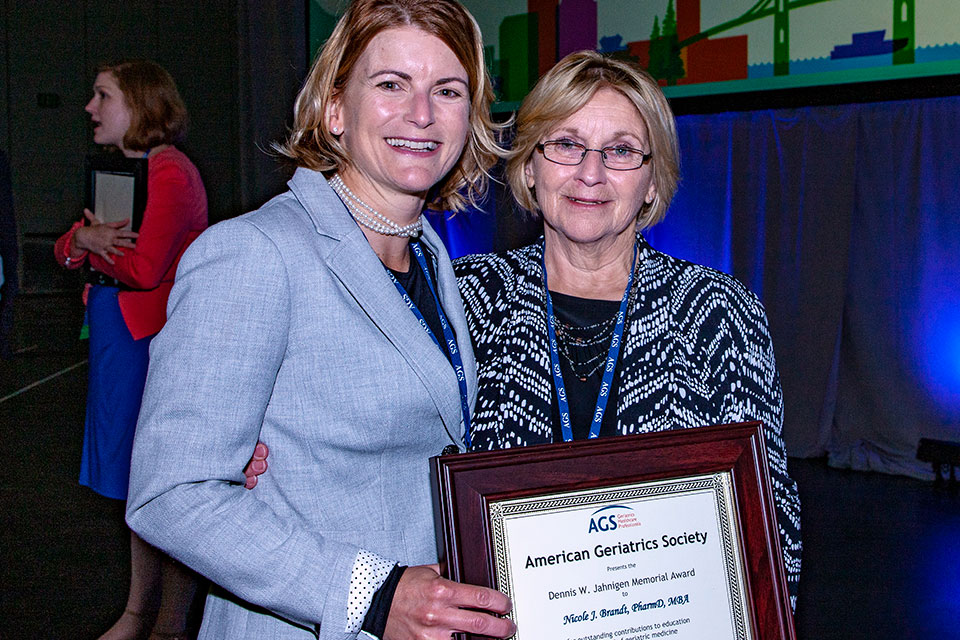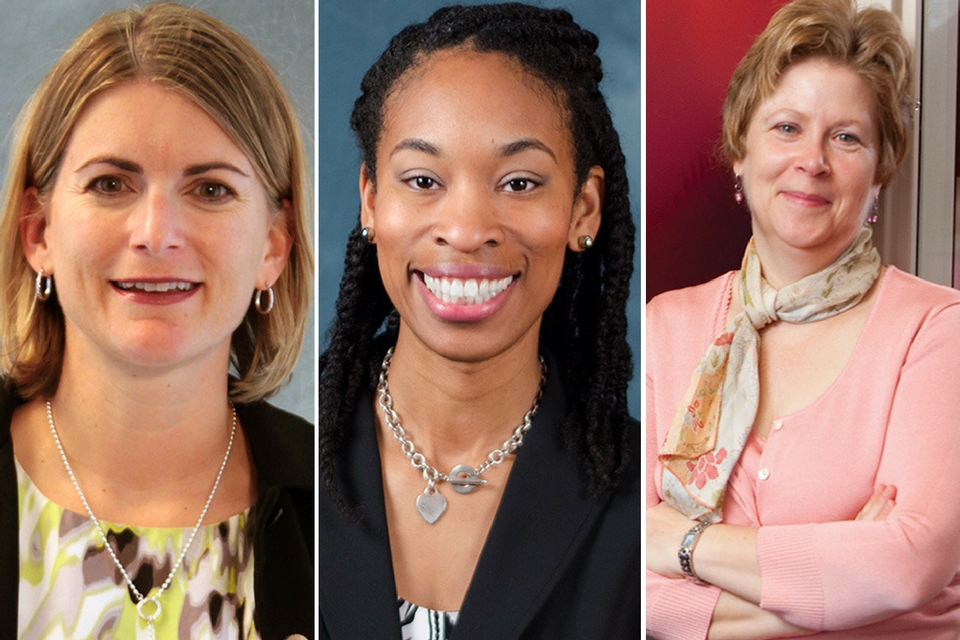SOP’s Brandt Receives National Award for Leadership in Geriatrics Education
The Dennis W. Jahnigen Memorial Award, presented by the American Geriatrics Society, recognizes individuals who have helped advance geriatrics education across the health professions.

By Malissa Carroll
May 22, 2019
Nicole Brandt, PharmD, MBA, BCPP, BCGP, FASCP, professor in the Department of Pharmacy Practice and Science (PPS) at the University of Maryland School of Pharmacy, has been named the 2019 recipient of the American Geriatrics Society’s (AGS) Dennis W. Jahnigen Memorial Award. This annual award recognizes AGS members who have provided leadership to train students in geriatrics and significantly contributed to the progress of geriatrics education in health profession schools.
Brandt, who also serves as executive director of the Peter Lamy Center on Drug Therapy and Aging at the School of Pharmacy, is the first pharmacist to be honored with the award.
“I was incredibly excited to learn that Dr. Brandt had been selected to receive the 2019 Dennis W. Jahnigen Memorial Award,” says Jill A. Morgan, PharmD, BCPS, BCPPS, professor and chair of PPS. “Dr. Brandt has dedicated her career to educating pharmacists and other health care professionals about the field of geriatric pharmacy. She is a champion of promoting safe medication use among older adults, and this award validates so much that she has accomplished over the years.”
Brandt completed her Doctor of Pharmacy (PharmD) and a residency in geriatric pharmacotherapy at the School of Pharmacy in 1997 and 1998, respectively. She joined the faculty in 1999, and later completed a Master of Business Administration (MBA) with a focus on health care management following a short sabbatical at the Centers for Medicare and Medicaid Services.
For more than two decades, Brandt has devoted her career to promoting best practices in medication management for older adults and advancing interprofessional geriatrics education for students and health care professionals alike. She developed the Geriatrics and Palliative Care Pathway in the School’s PharmD curriculum to increase students’ awareness and knowledge of medical issues associated with aging and advanced illness, as well as the principles of medication management in these populations. She also expanded the School’s PGY-2 Geriatric Pharmacy Residency Program to offer pharmacists the opportunity to train outside traditional health care facilities in settings that are key to supporting health and independence for older adults who want to remain at home or in the community.
Most recently, Brandt spearheaded the launch of a new two-year, post-PharmD geriatric pharmacotherapy fellowship within the Lamy Center, which she leads as the School’s first cross-departmental center in collaboration with the Department of Pharmaceutical Health Services Research (PHSR).
“I am so excited to see AGS recognizing Dr. Brandt for all of the work that she has done to advance geriatrics education not only at the School of Pharmacy, but across the entire University of Maryland, Baltimore campus,” says Barbara Resnick, PhD, RN, CRNP, FAAN, FAANP, professor in the Department of Organizational Systems and Adult Health and co-director of the Adult-Gerontology Primary Care Nurse Practitioner Specialty and Center for Excellence in Biology and Behavior Across the Life Span at the University of Maryland School of Nursing, who is a past recipient of the Dennis W. Jahnigen Memorial Award and one of Brandt’s long-time mentors. “It is always exciting to see non-physician health care professionals be recognized for their important work, and to see Dr. Brandt receive this recognition is particularly meaningful to me.”
Brandt has also served on numerous interdisciplinary teams across a variety of practice settings. She has directed projects involving multiple stakeholders focused on Medicare Part D Medication Therapy Management programs, high risk medications, and medication stewardship, and is currently leading initiatives to integrate sustainable pharmacist-directed services to help improve care for older adults with multiple co-morbidities at the MedStar Center for Successful Aging.
She is also one of the authors of the 2012, 2015, and 2019 AGS Beer’s Criteria – a list of medications that health care professionals should avoid prescribing or use with caution in older adults.
“As someone who knew Dr. Jahnigen, I believe he would be extraordinarily proud to learn that Dr. Brandt was selected to receive his memorial award,” says John R. Burton, MD, professor of medicine and director of the Johns Hopkins Geriatric Education Center, who was the first recipient of the Dennis W. Jahnigen Memorial Award in 1999, and another beloved mentor to Brandt. “Dr. Jahnigen believed that geriatrics should be inclusive of everyone in the health professions, and Dr. Brandt’s work is completely consistent with his vision. She is making enormous contributions not just at the School of Pharmacy, not just in partnership with us at Johns Hopkins Medicine, but across the entire country.”
Established in 1942, AGS is a nationwide, not-for-profit society of geriatrics health care professionals that works to improve the health, independence, and quality of life of older adults. Its nearly 6,000 members include geriatricians, geriatric nurses, social workers, family practitioners, physician assistants, pharmacists, and internists. Brandt received her award on May 3, at the 2019 AGS Annual Meeting Award Ceremony in Portland, Ore.
“It means so much to be recognized by my peers at AGS with this year’s Dennis W. Jahnigen Memorial Award,” says Brandt. “As the first pharmacist to receive this award, this recognition speaks to the role that pharmacists need to play on the interprofessional team when caring for older adults, as well as the need for us to continue to grow programs within schools of pharmacy that focus on caring for this population. We must address the public health imperative to help older adults age in place, and increasing awareness and knowledge about medication use and safety among current and future health care professionals is one of the ways we can achieve that goal.”



